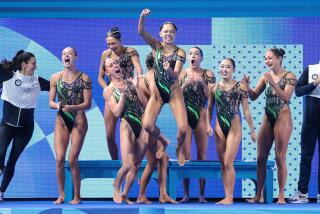SWIMMING / WORLD CHAMPIONSHIPS : Coaches Call for Escalation of Drug Battle
- Share via
ROME — China’s foes--or is it foils?--joined in a show of force on the final day of swimming’s World Championships on Sunday. But, unfortunately for them, it did not come in the Foro Italico pool as the Chinese women ended the meet the same way they started it six days before, sweeping all three events and breaking another world record.
Earlier Sunday, coaches from Australia, Great Britain, Sweden and Canada appeared at a news conference to release a petition signed by officials from 18 countries and the World Swim Coaches Assn. that called upon swimming’s international federation, FINA, to escalate its battle against banned substances. Among those signing was Dennis Pursley, U.S. Swimming’s national team director.
” . . . The apparent re-emergence of the extensive use of performance-enhancing drugs, especially in women’s competition, constitutes the single greatest threat to the progress and integrity of our sport,” the petition read.
FINA President Mustapha Larfaoui of Algeria, who did not attend the news conference, said he was not consulted about the petition but agreed with its intent.
“We’re going to improve all the conditions of our doping control and do the maximum number of tests possible,” he said.
No representative of China signed the petition. The team’s head coach, Chen Yunpen, said he was not even aware of it until it was shown to him by a reporter late Sunday afternoon.
“This is what we have been saying,” Chen said. “We are ready to be tested at all times. But this must also be for the Americans and all of the other countries.”
The coaches at the news conference said they did not decide to draft the petition until Saturday and they did not have time to contact representatives from all 103 nations competing. They said they did not know whether anyone from China had been approached, but they emphasized that the petition did not single out any nation.
Canada’s coach, Dave Johnson, made it clear, however, that the effort was inspired by the success of China’s women. He said the coaches decided they could not remain silent, as a majority of them did when East Germany’s women dominated the sport in the 1970s and ‘80s. After the fall of the Berlin Wall, their suspicions that the East Germans benefited from the systematic use of banned drugs were confirmed by documents.
“The parallels between the East Germans and the Chinese has left everyone with a fairly cynical attitude toward what they are seeing in the pool,” Johnson said.
At their most productive, East German women won 13 of 16 events and 24 medals during the 1986 World Championships in Madrid. The Chinese women almost matched that in Rome, winning 12 of 16 events and 19 medals.
They also set five world records, including Le Jingyi’s 50-meter freestyle time of 24.51 seconds Sunday. Their other two victories on the final day resulted in meet records, Liu Limin’s 2:07.25 in the 200 butterfly and He Cihong’s 2:07.40 in the 200 backstroke.
“I think the results of the Chinese are a sham,” said the U.S. women’s coach, Richard Quick of Stanford. “It sounds like sour grapes, but it’s a completely unfair playing field.”
Quick said if FINA does not deliver on its promise to intensify its fledgling program of out-of-competition, unannounced drug tests, he will recommend that the United States and other countries withdraw from the next World Championships, in either late 1998 or early ‘99, in Perth, Australia.
Paul Quinlan of Australia, vice-president of the World Swim Coaches Assn., said his organization will have a battle plan to present at a FINA meeting next August in Atlanta. One possible proposal, mirroring the NCAA’s death penalty, would call for a four-year suspension from international competition for a country after the fourth positive drug test involving its swimmers.
If that were the rule now, China would already be sidelined. Four Chinese women swimmers have tested positive for anabolic steroids since March of 1993.
“We’re getting impatient that things aren’t being done through the channels where they should be done, for whatever reason,” said Don Talbot, Australia’s coach. “If the suspicions are allowed to fester, we’re not going to have a sport. We might as well disband.”
The exploits of the Chinese, and the discussions of them, overshadowed some outstanding performances in the World Championships.
Of the 10 world records set, five were not accomplished by Chinese women. One that was not came Sunday night, when Finland’s Jani Sievinen swam the 200 individual medley in 1:58.16 to erase the previous record of 1:59.36 set in 1991 by Hungary’s Tamas Darnyi. Australia’s Kieren Perkins, who earlier set a world record in the 400 freestyle, won his second gold medal, finishing the 1,500 freestyle in 14:50.52.
Russia’s Alexander Popov swam the second-fastest 100 freestyle split ever, 47.68, on the final leg in the 400 medley relay, but American Gary Hall’s teammates gave him too much of a lead to lose as the United States won in a meet-record 3:37.74.
That was the United States’ 21st medal, the fourth gold. Both totals are all-time lows for the team in the World Championships.
Pursley said the Americans will have to improve if they expect more success in the 1996 Summer Olympics in Atlanta.
More to Read
Go beyond the scoreboard
Get the latest on L.A.'s teams in the daily Sports Report newsletter.
You may occasionally receive promotional content from the Los Angeles Times.






